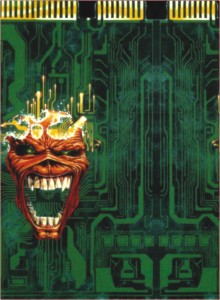| Spotlight
The Killer Within
'Oh No! Not again!' exclaimed Shahed in exasperation. His computer had crashed for the third time in two months, especially at a time when it shouldn't have happened! Shahed's Internship Report was due in two weeks and he really din't know what he could possibly do now. Surely enough, Shahed's computer was struck by a virus, a deadly one at that! Well he is not alone and all of us who use Computers regularly have to face it more or less from time to time. As much as the Personal Computer has become one of the biggest blessings of the late twenty first century, it is nothing short of a curse when there is a virus attack. Just like there are two sides to every coin, a computer does make work a lot easier and faster, but a computer crash, induced by a deadly virus can mean all work being lost, whether it is on a personal computer, or on a server in a large-scale office or industry.
 A computer virus, according to Wikipedia, is defined as, '… a computer program that can copy itself and infect a computer without permission or knowledge of the user…' but we commonly keep terming all malware programs as viruses erroneously. A virus can only spread from one computer to another when its host is taken to the uninfected computer, for instance by a user sending it over a network or the Internet, or by carrying it on a removable medium such as a floppy disk, CD or USB drive. Additionally, viruses can spread to other computers by infecting files on a network file system or a file system that is accessed by another computer. Viruses are sometimes confused with computer worms and Trojan horses. A worm can spread itself to other computers without needing to be transferred as part of a host, and a Trojan horse is a file that appears harmless until executed. A computer virus, according to Wikipedia, is defined as, '… a computer program that can copy itself and infect a computer without permission or knowledge of the user…' but we commonly keep terming all malware programs as viruses erroneously. A virus can only spread from one computer to another when its host is taken to the uninfected computer, for instance by a user sending it over a network or the Internet, or by carrying it on a removable medium such as a floppy disk, CD or USB drive. Additionally, viruses can spread to other computers by infecting files on a network file system or a file system that is accessed by another computer. Viruses are sometimes confused with computer worms and Trojan horses. A worm can spread itself to other computers without needing to be transferred as part of a host, and a Trojan horse is a file that appears harmless until executed.
Before giving the impression that this story is all about the technical jargon about computer viruses, I'll move on to discuss some of the worst computer viruses in the history of 'computer-kind'.
Morris, 1988
One of the first-ever Internet viruses, Morris was created by Cornell University student Robert T. Morris, who claimed its purpose was to measure the size of the Internet. Instead, since it used existing flaws in Unix sendmail and infected a given computer multiple times, it crippled roughly 6,000 computers (the Internet had an estimated 60,000).
Although Morris caused between $10 and $100 million in damage, he wound up with just three years' probation and a fine of $10,050 only, along with a teaching offer at MIT!
Melissa, 1999
Allegedly named after a Florida dancer who David L. Smith, its creator, fancied, Melissa forced major companies such as Microsoft, Intel Corporation and Alcatel-Lucent to shut down their email gateways due to the large volume of traffic the virus generated. Smith faced 40 years in prison and enormous fines, which he magically reduced to 20 months and $5,000 by spending a few years undercover helping the FBI catch other malware authors!
VBS/Loveletter, 2000
Starting on May 4 in the Philippines, this virus, also known as the 'I Love You' virus spread worldwide in a single day by using infected computers' email address lists to send large numbers of messages directed at new targets. It is thought to have caused $5.5 billion in damage, mostly in lost staff time, as corporate and government email systems had to be shut down to eradicate the virus.
Nimda, 2001
Nimda (“admin” spelled backwards) took just 22 minutes to spread worldwide. Nimda's secret was using several different propagation vectors: It created masses of emails to transmit itself, lured users to infected Web sites, and took advantage of lingering problems with Microsoft IIS security and previously installed Code Red or Sadmind worms. Nimda cost an estimated $635 million in damage.
 MyDoom, 2004 MyDoom, 2004
This email-transmitted virus, first identified on January 26, quickly spread by appearing to be an error message with an attachment that, when opened, emailed copies of the virus to addresses in the victim's address book, and also propagated itself through the Kazaa file-sharing service. Oddly, it avoided infecting computers at certain universities (University of California, Berkeley; Massachusetts Institute of Technology; Rutgers University and Stanford University) and corporations (Microsoft and Symantec Corp.), but then launched a distributed DoS attack against Microsoft and The SCO Group Inc. from about 1 million infected machines. Later versions attacked the Google, AltaVista and Lycos Inc. search engines.
Witty, 2004
Detected on March 19, Witty was the first virus to specifically attack network-protection software, in this case IBM Internet Security Systems' products (BlackICE, RealSecure Desktop, RealSecure Network and RealSecure Server Sensor). Witty's overall effects were relatively small because of its vendor-specificity; however, it demonstrated that a worm could affect a population of machines and networks whose administrators were actively taking steps to improve security.
However, making a new computer virus, as evil as it might sound, calls for a touch of class on the computer scientist designing it and is indeed a very difficult thing to do given all the antivirus software we usually keep installed on our computers. Each of the popular antivirus softwares is able to recognize hundreds of thousands of harmful executionable files and immediately deletes the infected files and shows the user a warning. So for a new virus to be able to cause harm, has to surpass stiff defence if it wants to cause any harm to the computer. The discovery can well be compared to the Stealth Fighter planes, which are able to keep themselves from radar signals. Or to a legendary Football Striker like Thierry Henry on his way to score a goal!
Talking of Antivirus, it is worth mentioning the names of the most popular ones which are likely to keep you (read 'your computer') safe from virus attacks. The following list, obtained from about.com, picks the best antivirus software based on its virus detection abilities, features, and breadth of protection. It is highly recommended that you choose one and thus save your PC!
1. Avira AntiVir Personal Edition Premium
2. Kaspersky Anti-Virus Personal
3. BitDefender Antivirus Plus
4. McAfee VirusScan Plus
5. Panda Antivirus 2007
6. F-PROT Antivirus
7. G Data AntiVirusKit (AVK)
8. AVG Anti-Malware
9. Eset Nod32
Because of the fact that virus attacks can cause a lot of damage, a score of hoaxes and myths have developed to scare people about possible virus threats. From completely illogical ones stating that the computer virus is transferring to human beings, to simple Powerpoint files being threatened as worms, lots of hoaxes have developed over the years.
One such hoax was the Y2K virus, which gained immense popularity even in Bangladesh. The "Y2K virus" claimed to crash all computers on 12:01 am on the 1st January of the year 2000. Media outlets worldwide fell for the Y2K virus hysteria. Later on, it proved to be a massive journalistic fiasco.
In addition to all the existing computer virus, cell phone viruses are being developed these days, as new models of cell phones strive towards including more features of the computer. So if you have an expensive handset, with all sorts of different options including internet access and infra-red and bluetooth, it is advisable to install an antivirus on it.
To keep your computer clean of viruses, it is advisable to check for them regularly using any isntalled antivirus and delete the infected files if theay are found. Also, attachments from unknown senders(email) should never be downloaded, specially if it is an exe (executable) file, unless if you know for sure what the purpose of the file is.
On an ending note, it must be stated that, with the age of information technology, it is not really possible to avoid computer malwares, so we should try to play it as safe as possible!
Copyright
(R) thedailystar.net 2008
|

